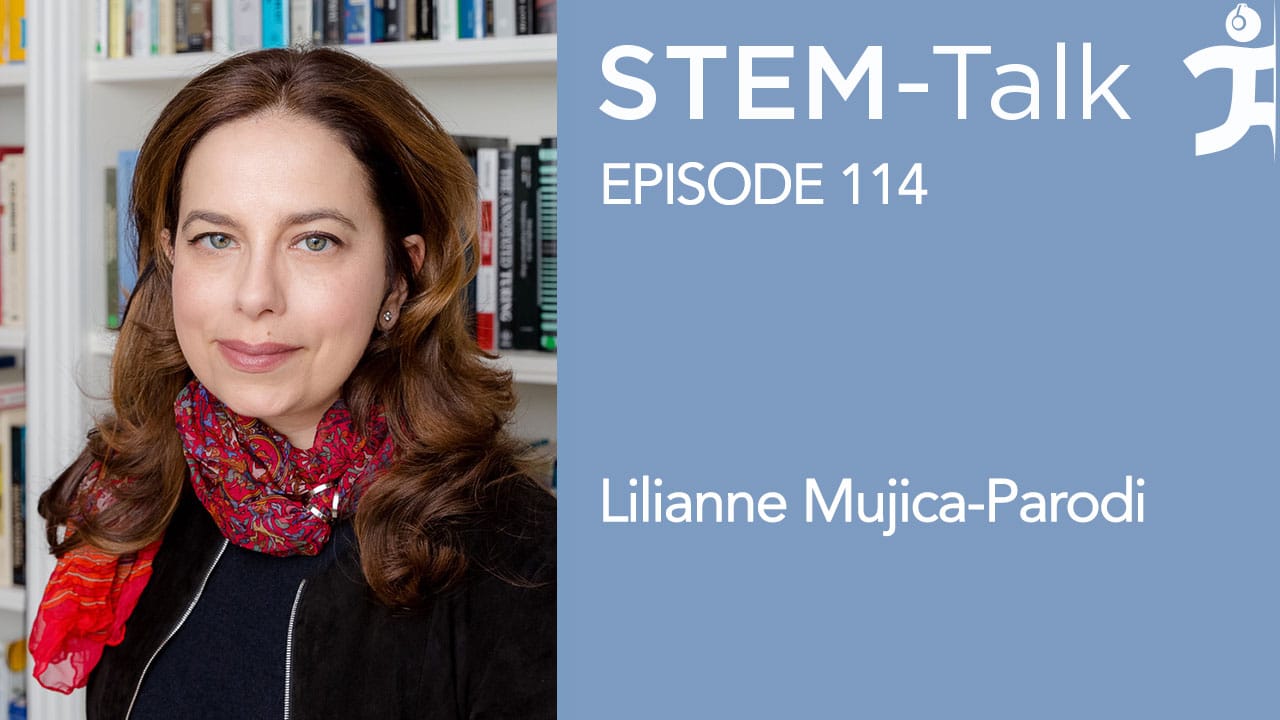STEM-Talk
Episode 114: Lilianne Mujica-Parodi talks about how diet and ketones affect brain aging
// Oct 28, 2020

Our guest today is Dr. Lilianne Mujica Parodi, the director of the Laboratory for Computational Neurodiagnostics at Stony Brook University.
We will be talking to Lily about her paper in PNAS last year that revealed neurobiological changes associated with aging can be seen in a person’s late 40s, a much younger age than what was previously thought. She and her colleagues at Stony Brook also found that this process may be prevented or even reversed based on dietary changes that involve minimizing the consumption of simple carbohydrates. The study’s targeted experiments showed that the biomarker for brain aging could be reliably modulated with consumption of different fuel sources. The study showed that decreasing glucose and increasing ketones resulted in the stability of brain networks.
Much of Lily’s work over the years has been focused on developing neuroimaging tools. In today’s interview, we talk to her about functional magnetic resonance imaging, also known as fMRI, which measures the small changes in blood flow that occur with brain activity. It may be used to examine the brain’s functional anatomy, evaluate the effects of stroke or other disease, and even guide brain treatment. Functional magnetic resonance imaging also can detect abnormalities within the brain that cannot be found with other imaging techniques.
Show notes:
[00:03:08] Dawn opens the interview asking Lily what she was like as a child. [00:04:20] Dawn mentions that Lily grew up in Maryland near the National Institute of Health. Lily talks about her experiences interning at the NIH in her senior year of high school. [00:09:41] Dawn asks what brought Lily to Georgetown University. [00:10:29] Ken asks about Lily’s experience at Georgetown University, where she majored in physics and philosophy. [00:15:16] Lily explains why she went to Columbia University after graduating from Georgetown. [00:19:14] Dawn asks about Lily’s research that led to her receiving the Brain and Behavior Research Foundation Young Investigator Award in 2000. [00:22:44] Dawn asks about Lily’s experience giving a lecture at the NIH while she was wrapping up her doctorate at Columbia. [00:27:00] Dawn asks what brought Lily to Stony Brook. [00:30:30] Ken asks Lily what attracted her to biomedical engineering. [00:32:58] Dawn mentions that much of Lily’s work at Stony Brook has been focused on developing neuroimaging tools. Dawn goes on to ask why neuroimaging has not provided the anticipated success for psychiatry and neurology that the electrocardiogram provided for cardiovascular medicine. [00:39:04] Ken mentions that Lily is the director of the Laboratory for Computational Neurodiagnostics. Lily gives an overview of the lab and the research conducted there. [00:44:00] Dawn mentions that Functional Magnetic Resonance Imaging, also known as fMRI, measures small changes in blood flow that occur with brain activity, and can be used to examine the brain’s functional anatomy, and evaluate various insults, diseases, and abnormalities, that cannot be found with other imagining techniques. Dawn asks Lily to explain the technology of fMRI and its various applications. [00:45:59] Ken asks about Lily’s 2016 paper published in the Frontiers of Neuroscience journal, that ran under the title, “Signal Fluctuation Sensitivity: An Improved Metric for Optimizing Detection of Resting-State fMRI Networks.” [00:49:36] Lily discusses her lab’s involvement in the development of a technology called “Near-Infrared Spectroscopy,” which is an attempt to replicate MRI-type imaging in an ambulatory environment such as an emergency room or a rural environment. [00:51:36] Dawn asks what led Lily to start researching diets and particularly the ketogenic diet. [00:56:59] Ken mentions that there are two key factors linked to age-based cognitive impairment, those being: insulin resistance and glucose hypometabolism. Lily explains how these two phenomena affect the brain. [00:59:33] Ken asks about Lily’s 2019 paper in PNAS, titled, “Diet Modulates Brain Network Stability, A Biomarker for Brain Aging, in Young Adults.” Lily explains how this study was conducted and what its results were. [01:05:53] Dawn mentions that there have been studies showing that ketones provide greater energy to cells than glucose, even when the fuels are calorically matched. Ketones also have been shown to benefit cardiovascular health. Dawn asks Lily to explain how her study and experiments provided the first evidence for equivalent benefits in the brain. [01:09:22] Ken asks about the better-known structural MRI measures of brain age, such as declining hippocampal size. [01:14:16] Ken asks what the response to Lily’s aforementioned paper has been. [01:16:31] Dawn asks Lily what her diet looks like. [01:17:04] Dawn follows up asking Lily about her exercise routine. [01:18:08] The interview ends with Dawn asking Lily how she spends her spare time.






